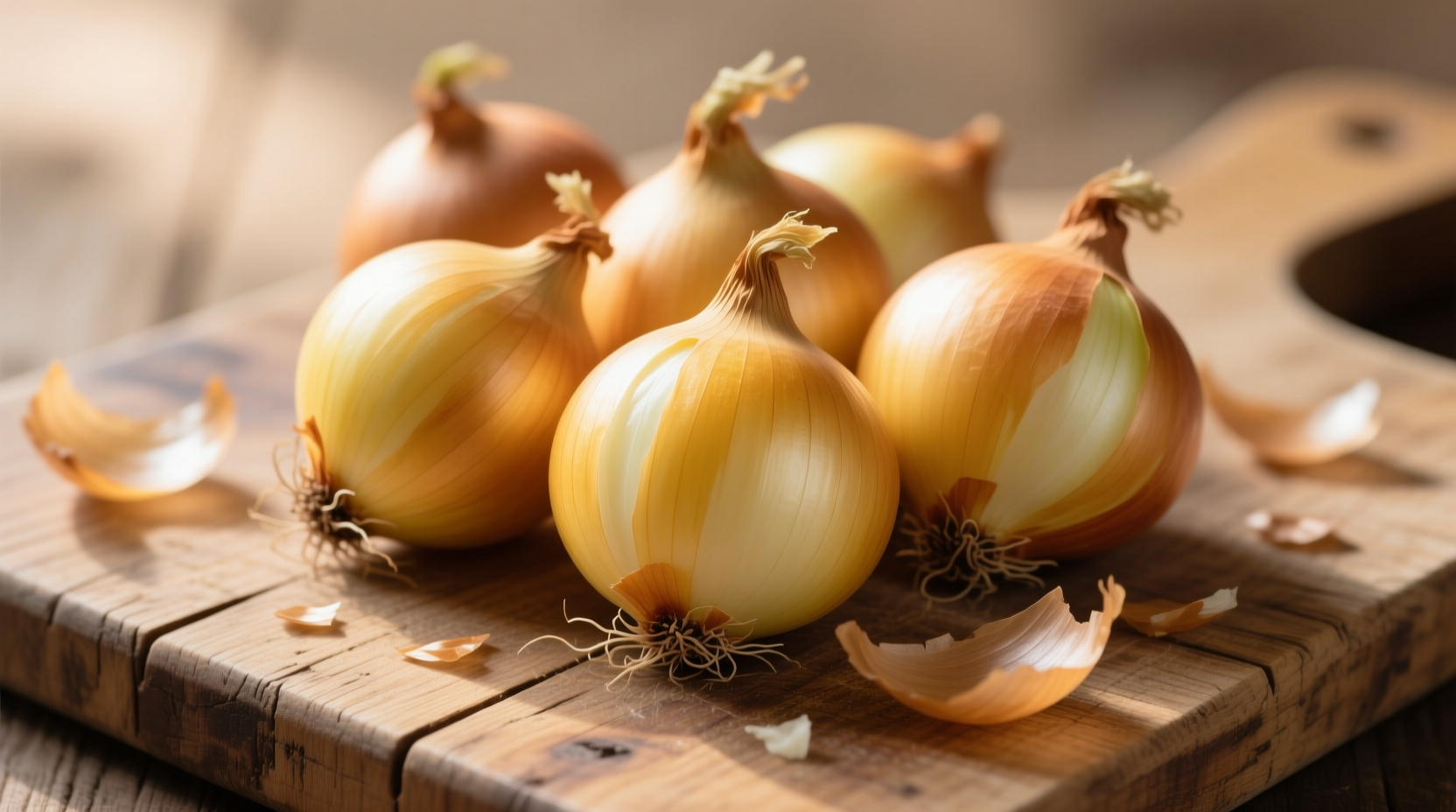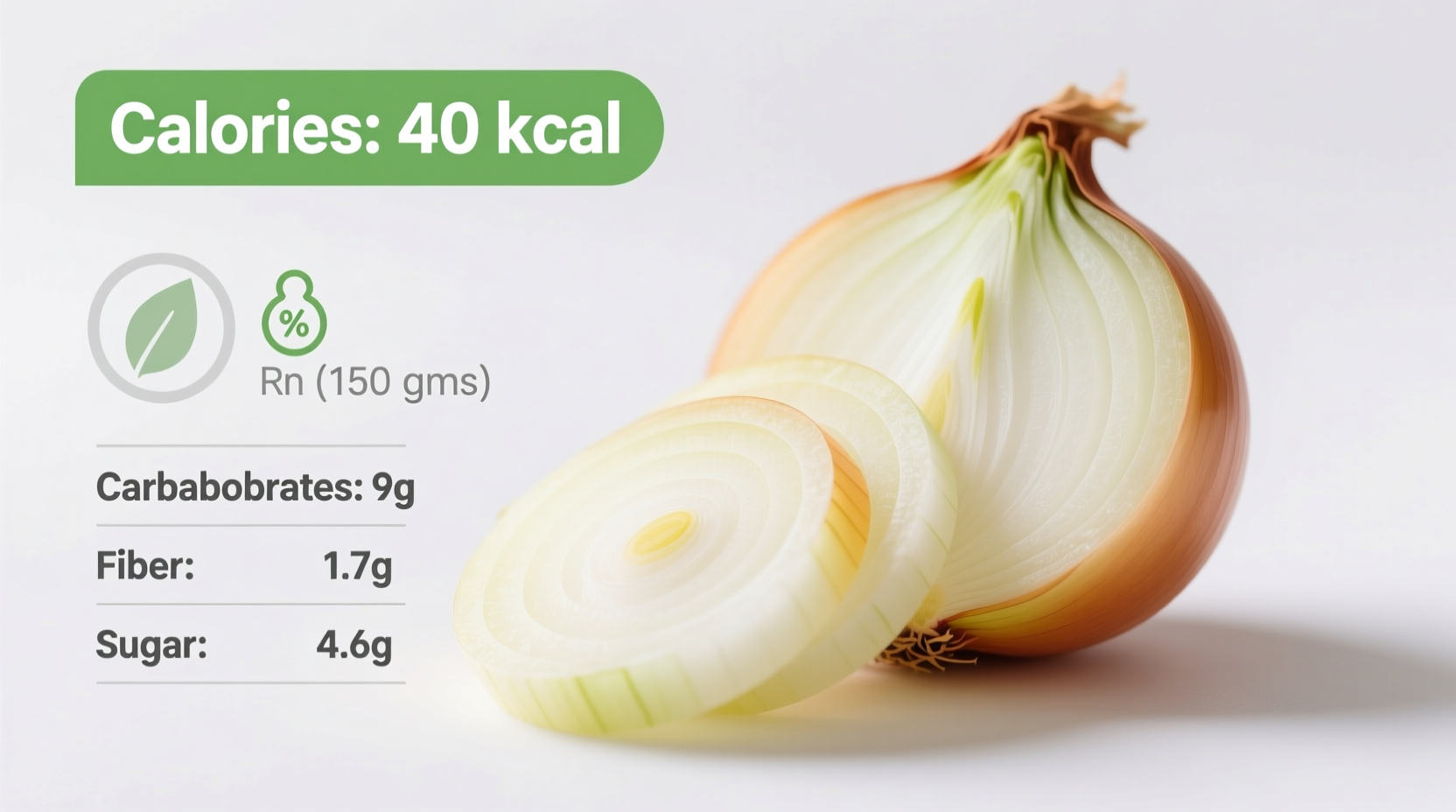Understanding the exact calorie content of common ingredients like onions is essential for anyone tracking their nutritional intake or managing dietary goals. Onions are a kitchen staple worldwide, but many people wonder about their impact on daily calorie counts. This guide delivers precise, science-backed information about onion calories across different varieties and preparation methods, helping you make informed choices without sacrificing flavor.
Onion Nutrition Basics: What the Numbers Really Mean
When evaluating how many calories onion varieties contain, it's crucial to consider serving size context. Most nutritional data references 100g portions, but real-world consumption differs significantly:
| Onion Type | Calories (per 100g) | Typical Serving Size | Calories Per Serving |
|---|---|---|---|
| Yellow Onion (raw) | 40 | 110g (medium) | 44 |
| Red Onion (raw) | 40 | 110g (medium) | 44 |
| White Onion (raw) | 42 | 110g (medium) | 46 |
| Green Onions (raw) | 32 | 100g (about 1 cup) | 32 |
| Caramelized Onions | 95 | 100g (cooked down) | 95 |
Data sourced from USDA FoodData Central (2023 update), the most current nutritional database maintained by the United States Department of Agriculture's Agricultural Research Service. The slight calorie increase in caramelized onions results from water evaporation concentrating natural sugars.
How Cooking Methods Affect Onion Calorie Content
Many people searching for how many calories onion preparations contain don't realize cooking dramatically changes nutritional density:
- Raw onions: Maintain lowest calorie density at 40 cal/100g
- Sautéed onions (with oil): Calories increase based on added fat (1 tsp oil adds 40 calories)
- Caramelized onions: Concentrated sugars raise calories to 95 cal/100g (but typical serving is smaller)
- Grilled onions: Minimal change if no added fats (42 cal/100g)
According to culinary research published by the USDA Agricultural Research Service, the natural fructose content in onions (3.86g per 100g) becomes more concentrated as water evaporates during cooking, explaining the calorie increase in caramelized preparations.

Practical Application: Using Onions in Calorie-Conscious Cooking
Professional chefs like Antonio Rodriguez emphasize that onions' low-calorie profile makes them ideal for flavor-building without excess calories. "When clients ask how many calories onion additions contribute," Rodriguez explains, "I show them how 44 calories can transform an entire dish's flavor profile without requiring high-calorie fats."
Maximize onion benefits while managing calories:
- Use raw onions in salads for crunch with minimal calories
- Substitute half the oil in sautéing with vegetable broth
- Add onions early in cooking to distribute flavor throughout dishes
- Try roasting whole onions instead of caramelizing for concentrated flavor with less sugar concentration
Common Misconceptions About Onion Calories
Despite being one of the most researched vegetables, several myths persist about onion nutrition:
- Myth: All onion varieties have different calorie counts
Fact: Yellow, red, and white onions have nearly identical nutritional profiles (40-42 cal/100g) - Myth: Cooking always increases vegetable calories
Fact: Only cooking methods that reduce water content (like caramelizing) concentrate calories - Myth: Onion calories come from starch
Fact: Onions contain natural sugars (fructose), not starch, with 9.34g carbohydrates per 100g
Nutritional Benefits Beyond Calories
While tracking how many calories onion servings contain matters for calorie counters, onions offer significant nutritional advantages:
- Rich in vitamin C (7.4mg per 100g - 8% of daily value)
- Contains quercetin, a powerful antioxidant with anti-inflammatory properties
- Provides 1.7g dietary fiber per 100g (6% of daily value)
- Naturally sodium-free (0mg per 100g)
Research from the National Institutes of Health shows that regular onion consumption correlates with improved cardiovascular health markers, making their modest calorie count an excellent nutritional investment.
Putting Onion Calories in Perspective
Understanding where onions fit within daily nutritional needs provides valuable context. A medium onion represents just 2% of a standard 2,000-calorie daily diet. Compare this to common flavor enhancers:
- 1 tbsp butter: 102 calories
- 1 tbsp olive oil: 119 calories
- 1/4 cup grated Parmesan: 110 calories
- 1 medium onion: 44 calories
This comparison demonstrates why professional chefs recommend onions as foundational flavor builders in calorie-conscious cooking. Their ability to enhance savory notes (umami) without significant caloric cost makes them invaluable for health-focused meal preparation.











 浙公网安备
33010002000092号
浙公网安备
33010002000092号 浙B2-20120091-4
浙B2-20120091-4